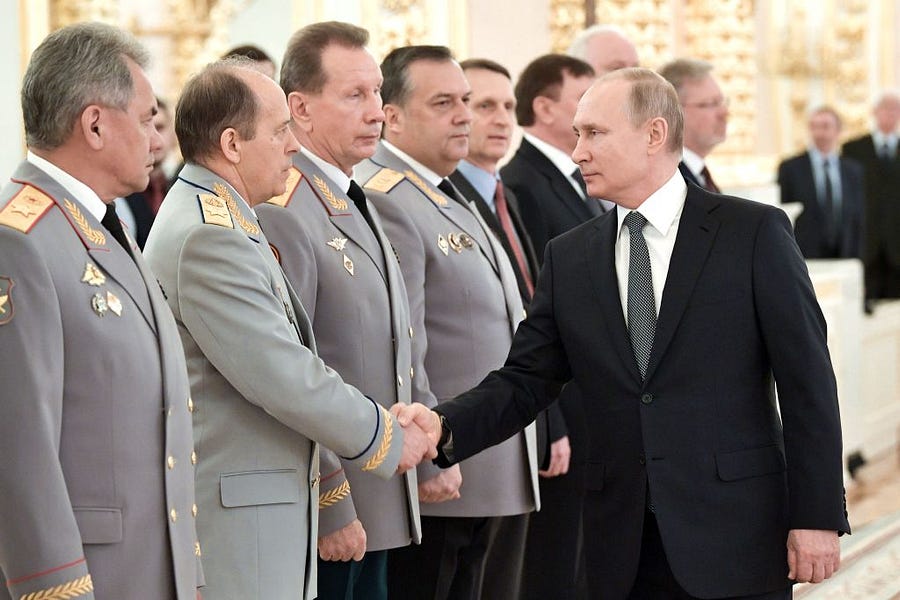For someone prone to publicity stunts such as riding shirtless on horseback and hugging sedated polar bears, Russian President Vladimir Putin spent a remarkable stretch of his early career blending into the background.
He quietly rose through the ranks of the Soviet-era KGB and its Russian successor, the FSB, before pursuing a more public life in his mid-40s. But more than three decades after the fall of the Berlin Wall, the one-time “spymaster” leads Russia through the Cold War lens of paranoia, vigilance, and aggressive espionage.
And that’s where Ukraine hit Putin Monday: at the heart of Russia’s intelligence operations. In a massive data drop, the Ukrainian military intelligence service released the names, phone numbers, and passports of Russian spies operating in Europe on behalf of Putin’s former employer, the FSB.
Within 24 hours of the list’s disclosure, Belgium’s foreign minister told 21 Russian diplomatic officials to leave the country within 15 days for alleged espionage. The Czech Republic, Ireland, and the Netherlands followed suit the same day, with the Dutch ordering 17 of their country’s 75 declared Russian diplomats to depart within two weeks. On Wednesday, Slovakia expelled 35 Russian officials—a large percentage of Moscow’s remaining diplomatic corps there.
In a post to Facebook, Slovakian Prime Minister Eduard Heger accused the Russian embassy of posing an “unbearable security risk” to the country amid attempts to “carry out massive intelligence operations, corrupt our citizens, spread information, and polarize our society.”
The Kremlin’s practice of masquerading spies as diplomats is just one component of its clandestine reach into European NATO member states. Sleeper agents, cyber breaches, traditional and social media disinformation operations, and support for pro-Russian movements are among the many tools with which Moscow tries to covertly shape the continent’s geopolitical landscape to its desired form. And in the weeks since the Russian military launched a multifront invasion of Ukraine, those efforts have only intensified.
“Russian espionage increased dramatically since [Vladimir] Putin took office. The war in Georgia was certainly one big boost. The Russians started to increase their political work, transitioning from traditional espionage to subversion and illicit financing and recruiting ‘useful idiots,’” said Gustav Gressel, a Berlin-based analyst at the European Council on Foreign Relations.
In the aftermath of Russia’s 2008 invasion of Georgia, Russian officials, oligarchs, and criminal networks built out money laundering networks abroad, using shell companies to stash ill-gotten gains from drug dealing, human trafficking, and other illegal activities. All the while, the Kremlin cultivated relationships with sympathetic political figures and movements in Europe. The nest egg and political allies eventually helped to soften the blow of sanctions after Russia’s first invasion of Ukraine in 2014, but not enough to spare Moscow some financial hurt.
Multinational sanctions targeting Russia’s defense industry proved particularly painful, spurring the development of a specific brand of espionage designed to bypass export controls and gain access to embargoed military technology.
Amid the new coordinated and crippling sanctions on Russia by the U.S. and partners worldwide, we can expect this form of surveillance and covert trade to once again become a “growing trend,” one European intelligence official told The Dispatch. Putin will likely try to bypass U.S.-led restrictions on vital technology like semiconductors, lasers, and telecommunications software, which should strain Russia’s ability to compete in global markets. “The things they’re not able to get now legally, they will try to acquire clandestinely,” the official said.
One way analysts expect Russia to do so—one Russia has done in the past—is using cyber breaches to steal intellectual property and disrupt the economies of its adversaries. A Slovakian intelligence official confirmed that the country’s intelligence agency is working to address the heightened threat of Russian cyber breaches amid Putin’s ground war in Ukraine.
But even as Russia’s remote capabilities proliferate, some NATO countries are vulnerable to the Kremlin’s penchant for more traditional forms of interpersonal espionage—those of the James Bond variety.
Shortly after the Biden administration took office in 2021, Bulgaria’s prosecutor-general claimed to have broken up a network of undercover Russian-backed agents attempting to bribe Bulgarian government officials into leaking classified information on the European Union and NATO.
The year prior, the Bulgarian government attributed to three Russian nationals a 2015 nerve agent attack on a Bulgarian arms manufacturer, Emilian Gebrev, and two other people. And in April 2021, Czech authorities linked the deadly bombing of a weapons depot in the Czech Republic to Russian operatives. It broke shortly thereafter that Gebrev, Russia’s would-be victim in Bulgaria and a suspected supplier of arms to Ukraine, had been storing ammunition at the depot.
But Putin’s most recent war in Ukraine has kneecapped Russia’s ability to conduct on-the-ground intelligence gathering, as NATO countries reinforce their borders and expel suspected spies. Instead, Russia is enlisting more spies from foreign nationals traveling to and from Russia and its ally, Belarus. Last week, the Times reported on Russian attempts to pay off Estonians in exchange for pictures and intel about vulnerabilities in Estonia’s border, military, and overall morale amid the nearby war.
In an interview with The Dispatch, a European intelligence official confirmed that Russian operatives, typically disguised in civilian garb, have also approached people traveling to and from Lithuania in recent weeks. “This is a classical sort of intelligence from the territory, when they try to approach foreign citizens when they visit Russia,” the official said. “When they don’t have the abilities or capabilities to run operations on our soil, they try to approach allied citizens who happen to travel to Russia.”
But the Baltic states, particularly Lithuania and Latvia, tend to be among eastern Europe’s most resilient against attempted Russian interference. Lithuania’s media watchdog shut down the broadcasts of six Russian language channels on February 25, the day after Putin’s invasion of Ukraine, for “war incitement.” The country has also sanctioned Russian-sponsored networks in the past.
In other NATO countries, though, Russia’s disinformation campaigns have taken root. According to Victor Breiner, director of the Slovakian ministry of defense’s hybrid threats and counter-disinformation unit, Russian propaganda has developed into a normalized feature of Slovakia’s political and cultural discourse. During the country’s 2016 parliamentary elections, Breiner said, being associated with the outlets producing pro-Russian propaganda was a “reputational hazard.” By the 2020 election cycle, however, being featured on these sites became a “must” for populist politicians.
The problem has only been exacerbated by Facebook, which has a user base of more than 3 million of Slovakia’s 4 million adult population. Amid a hot war in Ukraine, false social media narratives carry real-life consequences. “After the 24th of February, I’m here sitting in a situation room and looking at what the Russian state is pushing through their websites, their media, their influencers just leaking, within hours, into our space,” Breiner told The Dispatch. “The strategic goal is to sway the public opinion against lethal aid to Ukraine.”
Among the narratives Russia pushes in Slovakia are those that it has disseminated worldwide: Ukrainian armed forces’ alleged access to biological and chemical weapons, the outsize economic impact of sanctions on Russia, and Ukraine’s required “de-nazification.” But many pro-Russian websites and political figures make direct attacks on Slovakia’s place within the NATO alliance.
Prominent among them is former Prime Minister and nationalist Smer party leader Robert Fico, who described Slovakia’s recent welcome of multinational NATO troops as akin to “treason” and “welcoming of the Wehrmacht.”
“They spread various conspiracy theories that nuclear weapons are going to be placed in Slovakia, which is ridiculous, that NATO or American soldiers are going to be above the law and are going to be raping women,” said Katarína Klingová, a senior research fellow at the Bratislava-based Globsec Policy Institute and co-author of its Vulnerability Index, a metric that evaluates European countries’ susceptibility to malign foreign influence. “A lot of people think that NATO is an aggressive organization and a tool of the U.S. to control other countries.”
Similar Russian narratives have taken hold elsewhere. In Sofia, Bulgaria, U.S. Secretary of Defense Lloyd Austin was greeted last month by protesters waving Russian and Bulgarian flags and chanting “NATO out.”
But as fighting in Ukraine drags on and civilian casualties mount, Putin’s unprovoked war of aggression has catalyzed a “hardcore wake-up call” among many Europeans once vulnerable to Russian influence campaigns, Klingová said. In late January, a plurality of Slovaks—44 percent—placed primary responsibility for increased tensions along Ukraine’s border on the U.S. and NATO. Less than a month later, after the invasion began, more than 60 percent believed that Russia was to blame.
One European intelligence official attributed the continent’s surge in anti-Russian sentiment to the West’s exposure of Putin’s plans ahead of the attack. While intel leaks and tough rhetoric looked hawkish in the moment, the official argued, they’re now vindicated: “Every single time, Russia [has been] really able to dominate the information sphere. They’ve managed to do that in so many cases that we always felt like we were on the losing side, and this was quite the opposite. This—at least for the first time in several years—put the Russians in a pretty uncomfortable position.”









Please note that we at The Dispatch hold ourselves, our work, and our commenters to a higher standard than other places on the internet. We welcome comments that foster genuine debate or discussion—including comments critical of us or our work—but responses that include ad hominem attacks on fellow Dispatch members or are intended to stoke fear and anger may be moderated.